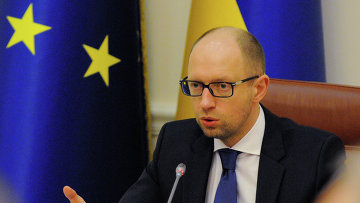
Ukrainian President to Form ‘Pro-European Coalition’
Publication: Eurasia Daily Monitor Volume: 11 Issue: 198
By:

The parties of President Petro Poroshenko and Prime Minister Arseniy Yatsenyuk won an early parliamentary election on October 26 and have started talks on forming a new governing coalition. As radicals of all kinds lost the election, Ukraine now has a chance to obtain a workable legislature and an efficient executive branch of government. People linked to the kleptocratic government that was toppled by the Maidan mass street demonstrations last February also performed weakly, largely because their electoral strongholds have been inadvertently destroyed by Moscow through annexing Crimea and cutting densely populated areas in Donbas (eastern region encompassing the Ukrainian provinces of Luhansk and Donetsk) from the rest of Ukraine. Moscow’s puppets held their own elections in the areas under their control on November 2, further isolating their self-proclaimed Donetsk and Luhansk “people’s republics” from Ukraine.
The victory of the Bloc of Poroshenko (BoP) in the October 26 election was not as convincing as opinion polls had predicted. What is more, not the BoP, but Yatsenyuk’s People’s Front (PF) won the proportional vote contest among parties (half of the 450 seats in the unicameral legislature were elected on a proportional basis; the other half were elected in single-mandate, first-past-the-post districts) with 22.2 percent of the votes, closely trailed by the BoP (21.8 percent). Lviv Mayor Andriy Sadovy’s Self-Help party finished a surprising third with 11.0 percent. Self-Help preformed especially well in Lviv and Kyiv, advertising the fact that there were no former or current people’s deputies or government officials among its ranks.
The Opposition Bloc, which is closely associated with the previous government, came fourth with 9.4 percent, winning the election in the government-controlled areas in Donbas. The Radical Party (RP) of pitchfork-wielding populist Oleg Lyashko (7.5 percent) and the moderate nationalist party Fatherland, headed by Yulia Tymoshenko (5.7 percent) also overcame a 5-percent threshold to parliament (ukraine-elections.com.ua, accessed on November 5). Thanks to winning in many first-past-the-post single-member constituencies, from which the other half of the deputies were elected, the BoP is likely to take around 130 seats in parliament or more, while PF will have more than 80.
The final results are to be announced by the Central Electoral Commission by November 10, but with more than 99.9 percent of the votes counted, it is clear that the far right represented by Freedom and Right Sector failed to overcome the barrier to entry into the parliament in the proportional vote. They are likely to have only seven deputies combined, all elected in single-member constituencies (vyboryrada2014.pravda.com.ua, accessed on November 5). This is destructive to the Moscow propaganda myth about “fascists” running the Kyiv government. Interestingly, the three winning parties did not even exist at the time of the Maidan uprising last winter, so Ukraine has a truly new parliament and a chance to form a new, pro-Western and corruption-free executive branch. The defeat of the radicals should make it easier for Kyiv to deal with both the European Union and Russia. Russian Foreign Minister Sergei Lavrov publicly welcomed Freedom’s defeat in a recent interview, and commended the BoP as a peaceful force (mid.ru, October 28).
Poroshenko said in his address to the nation on November 3 that five “pro-European” parties—the BoP, PF, Self-Help, Fatherland and the RP—should form a government coalition. It had been speculated that the RP and Fatherland, as the two most radical parties among the “pro-European” ones, could be left outside the coalition, alongside the Opposition Bloc. However, the RP and Fatherland have apparently agreed not to seek high positions in a new government (ICTV, November 3; facebook.com/O.Liashko, November 4), which is likely to speed up coalition talks. Poroshenko said Yatsenyuk should continue to serve as prime minister. At the same time, Poroshenko said the rest of the cabinet should be replaced in order to clear it of non-professionals and the party-quota principle, which, the president argued, was conducive to corruption (president.gov.ua, November 3). Jointly with Self-Help, the RP and Fatherland, the parties of Poroshenko and Yatsenyuk will have well over half the seats in parliament. And if more sympathetic independents elected in single-seat constituencies join, their coalition may control more than two-thirds of the legislature.
Meanwhile, Russia-backed militants held their own election on November 2. Ukraine, the EU and the United States did not recognize it, warning that this would be a new obstacle to peace (liga.net, November 3). However, the Russian foreign ministry said in a statement that it “respected the will of the people of the South-East [of Ukraine]” and that “the elected representatives have a mandate to solve practical tasks in order to restore normal life” in the area (mid.ru, November 3). The sham election was held in violation of the September 5 ceasefire agreement. Its results are not as important as the very fact that it took place. Now Moscow and the militants claim that the Donetsk and Luhansk “people’s republics” have legally elected representatives and can form their own legislatures and executives. Thus, the area is turning into another Russia-backed unrecognised “country” and a source of regional instability—like Transnistria in Moldova, and Abkhazia and South Ossetia in Georgia.
Poroshenko has reacted to the sham election by revoking his law on special status for the separatist-controlled areas (president.gov.ua, November 4). The law aimed to gradually reintegrate the areas controlled by the militants into Ukraine, in particular through holding early local elections in those areas in December. Such plans now appear moot, and the ceasefire in Donbas between government forces and the Moscow-backed rebels appears increasingly fragile.




